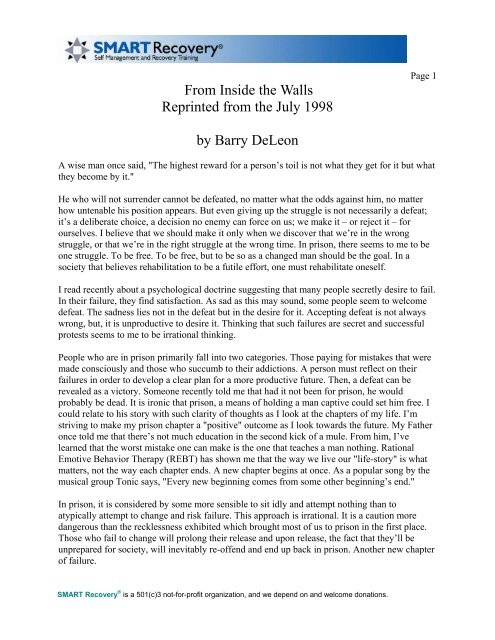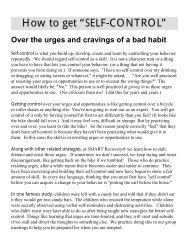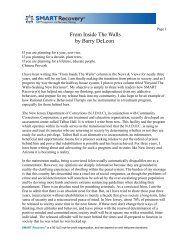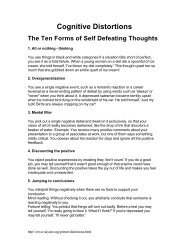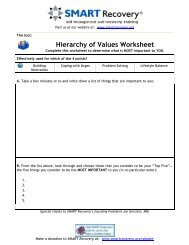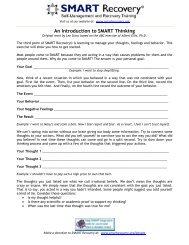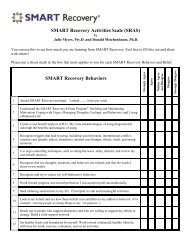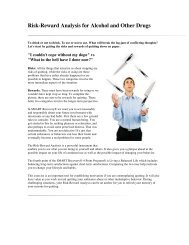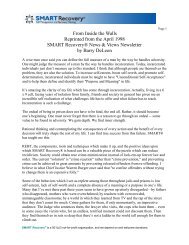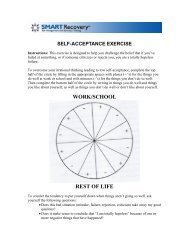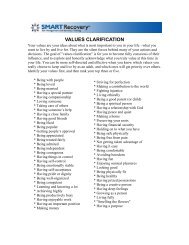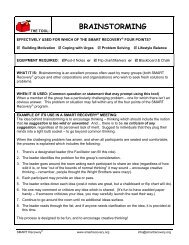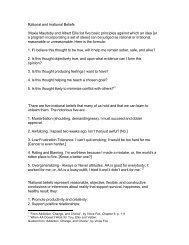From Inside the Walls Reprinted from the July ... - SMART Recovery
From Inside the Walls Reprinted from the July ... - SMART Recovery
From Inside the Walls Reprinted from the July ... - SMART Recovery
Create successful ePaper yourself
Turn your PDF publications into a flip-book with our unique Google optimized e-Paper software.
<strong>From</strong> <strong>Inside</strong> <strong>the</strong> <strong>Walls</strong><strong>Reprinted</strong> <strong>from</strong> <strong>the</strong> <strong>July</strong> 1998Page 1by Barry DeLeonA wise man once said, "The highest reward for a person’s toil is not what <strong>the</strong>y get for it but what<strong>the</strong>y become by it."He who will not surrender cannot be defeated, no matter what <strong>the</strong> odds against him, no matterhow untenable his position appears. But even giving up <strong>the</strong> struggle is not necessarily a defeat;it’s a deliberate choice, a decision no enemy can force on us; we make it – or reject it – forourselves. I believe that we should make it only when we discover that we’re in <strong>the</strong> wrongstruggle, or that we’re in <strong>the</strong> right struggle at <strong>the</strong> wrong time. In prison, <strong>the</strong>re seems to me to beone struggle. To be free. To be free, but to be so as a changed man should be <strong>the</strong> goal. In asociety that believes rehabilitation to be a futile effort, one must rehabilitate oneself.I read recently about a psychological doctrine suggesting that many people secretly desire to fail.In <strong>the</strong>ir failure, <strong>the</strong>y find satisfaction. As sad as this may sound, some people seem to welcomedefeat. The sadness lies not in <strong>the</strong> defeat but in <strong>the</strong> desire for it. Accepting defeat is not alwayswrong, but, it is unproductive to desire it. Thinking that such failures are secret and successfulprotests seems to me to be irrational thinking.People who are in prison primarily fall into two categories. Those paying for mistakes that weremade consciously and those who succumb to <strong>the</strong>ir addictions. A person must reflect on <strong>the</strong>irfailures in order to develop a clear plan for a more productive future. Then, a defeat can berevealed as a victory. Someone recently told me that had it not been for prison, he wouldprobably be dead. It is ironic that prison, a means of holding a man captive could set him free. Icould relate to his story with such clarity of thoughts as I look at <strong>the</strong> chapters of my life. I’mstriving to make my prison chapter a "positive" outcome as I look towards <strong>the</strong> future. My Fa<strong>the</strong>ronce told me that <strong>the</strong>re’s not much education in <strong>the</strong> second kick of a mule. <strong>From</strong> him, I’velearned that <strong>the</strong> worst mistake one can make is <strong>the</strong> one that teaches a man nothing. RationalEmotive Behavior Therapy (REBT) has shown me that <strong>the</strong> way we live our "life-story" is whatmatters, not <strong>the</strong> way each chapter ends. A new chapter begins at once. As a popular song by <strong>the</strong>musical group Tonic says, "Every new beginning comes <strong>from</strong> some o<strong>the</strong>r beginning’s end."In prison, it is considered by some more sensible to sit idly and attempt nothing than toatypically attempt to change and risk failure. This approach is irrational. It is a caution moredangerous than <strong>the</strong> recklessness exhibited which brought most of us to prison in <strong>the</strong> first place.Those who fail to change will prolong <strong>the</strong>ir release and upon release, <strong>the</strong> fact that <strong>the</strong>y’ll beunprepared for society, will inevitably re-offend and end up back in prison. Ano<strong>the</strong>r new chapterof failure.<strong>SMART</strong> <strong>Recovery</strong> ® is a 501(c)3 not-for-profit organization, and we depend on and welcome donations.
Page2To evaluate life’s chapters, we need to understand where our lives are going – and many of usdon’t. We don’t have a meaning and purpose in our lives. We can’t "see" <strong>the</strong> end of a chapter.We can’t "see" <strong>the</strong> story’s happy ending. We see ourselves in <strong>the</strong> night and believe <strong>the</strong>re willnever be ano<strong>the</strong>r day. But, what if ano<strong>the</strong>r day is right around <strong>the</strong> corner? What if victory anddefeat are only different ways of looking at an incident in an unending narrative? In suchcontext, failure never comes at <strong>the</strong> end of an endeavor; it comes at <strong>the</strong> beginning. What matters,especially in my environment, is not <strong>the</strong> outcome, but <strong>the</strong> input; not <strong>the</strong> failure of where we findourselves but <strong>the</strong> success of closing this chapter and moving on to <strong>the</strong> next. Prison is understoodto be a failure but I believe that <strong>the</strong> deeper <strong>the</strong> hole, <strong>the</strong> greater <strong>the</strong> euphoria climbing out.It has been over a year since I took part in a facilitated <strong>SMART</strong>® group. Rich Dowling, whobegan <strong>the</strong> <strong>SMART</strong>® program in MCCF here in New Jersey introduced me to what I believe tobe <strong>the</strong> single most (comprehensive) program and way of thinking for turning failures intovictories. The concepts of <strong>SMART</strong>®, properly interpreted and sincerely applied to one’s life, canturn an apparent "dead-end" into a fork in <strong>the</strong> road. Every dead-end street has one end open; <strong>the</strong>way in is often <strong>the</strong> way out.<strong>SMART</strong>® turns lemons into lemonade. The principles work, <strong>the</strong> concepts can guide one’s life,and <strong>the</strong> tools and techniques of REBT can truly enable us to gain independence <strong>from</strong> addictivebehaviors. More than that, it can help us find meaning and purpose in our lives.Editor’s Note: Barry would welcome your letters and thoughts regarding this and previous"<strong>From</strong> <strong>Inside</strong> <strong>the</strong> <strong>Walls</strong>" columns. Letters may be addressed to: Barry DeLeon, #131953,G.S.Y.C.F., PO Box 11401, Yardville, NJ 08620.<strong>SMART</strong> <strong>Recovery</strong> ® is a 501(c)3 not-for-profit organization, and we depend on and welcome donations.


